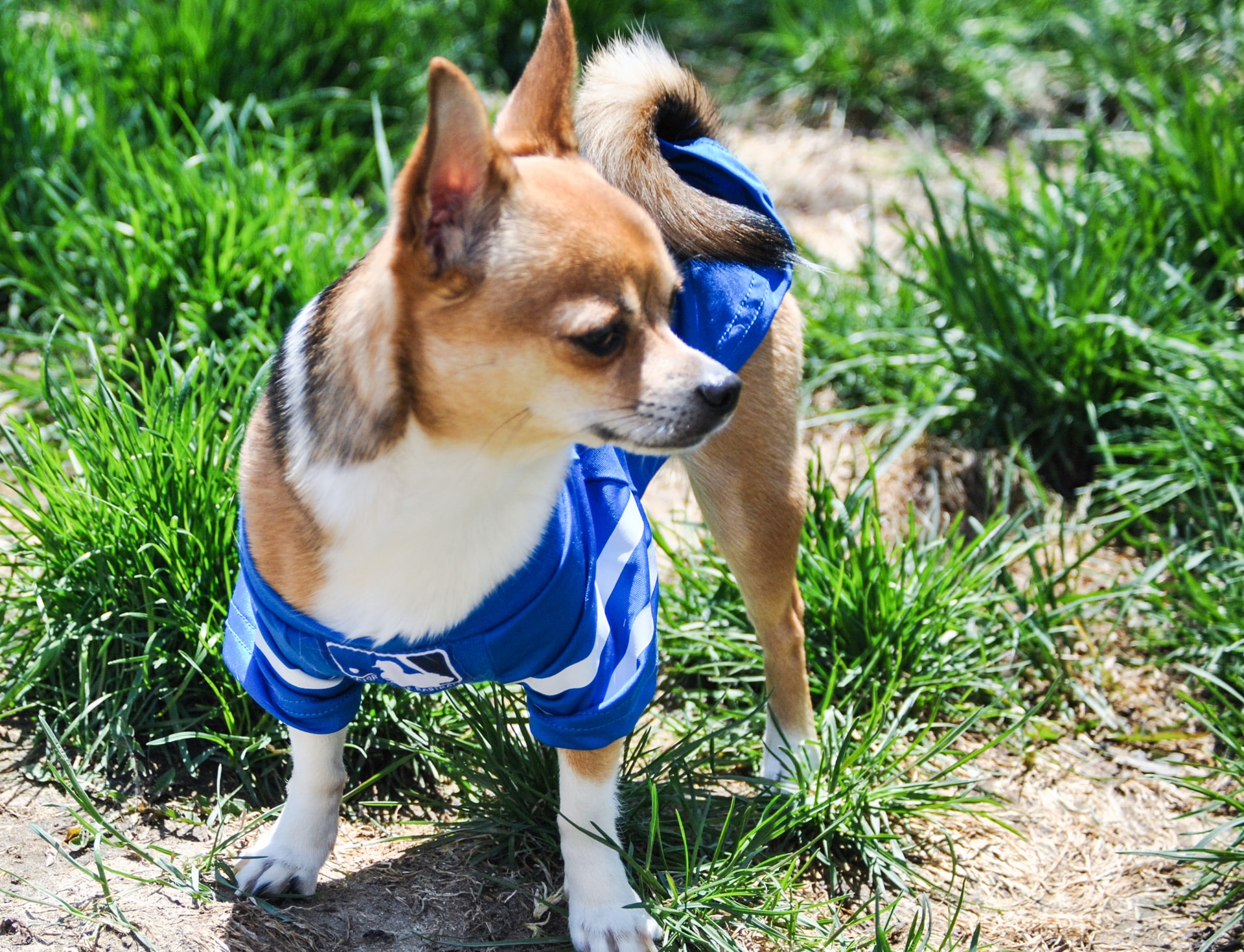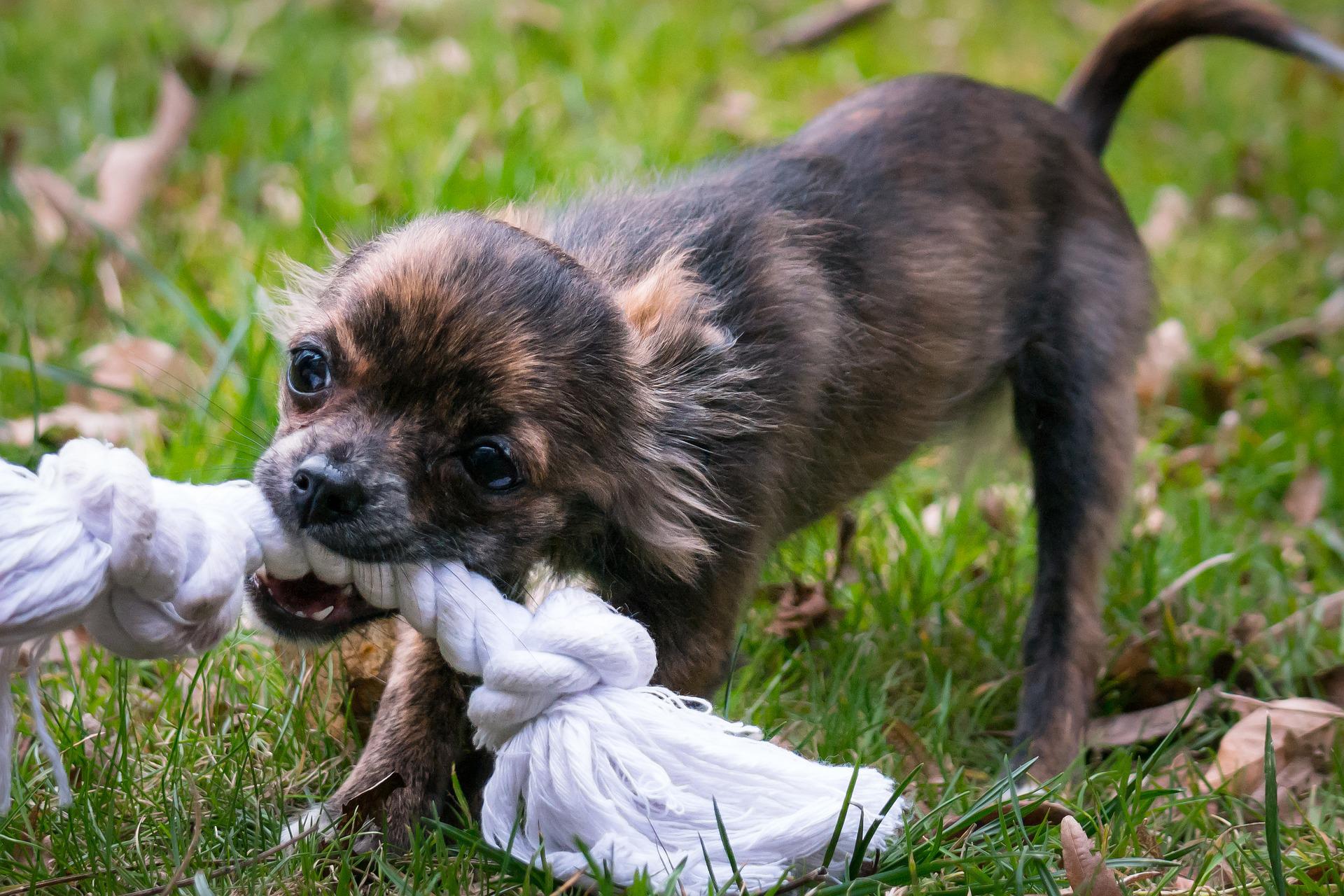The idea of eating poop may turn your stomach, but it’s something fairly common among canines. Even your little Chihuahua may try to snack on its feces. There are many possible reasons behind this behavior. At the same time, there are multiple ways how to stop Chihuahua from eating poop.
Also known as coprophagia, poop eating in dogs is considered to be common. However, this habit can turn dangerous as feces contains loads of bacteria and pathogens.
Unfortunately, there are dog owners who will rehome or surrender their dogs just because they discovered their poop-eating habit. Worse, it may even push other pet owners to euthanize their dogs.
Overall, coprophagia isn’t a life sentence. There are ways to defeat it and it shouldn’t dictate the fate of your Chihuahua. After all, it’s a very common phenomenon, which happens to around 24% of dogs across breeds.
In this post, I discuss the possible reasons behind this behavior and what you can do about it. Please note that the advice here doesn’t replace the professional expertise of a veterinarian. Aside from this guide, you should also consult your Chihuahua’s vet for the best solution.
Why is my Chihuahua eating poop?
There are many possible reasons why your Chihuahua is eating poop. This reason will affect how the condition will be treated and to what extent you have to worry.
Basically, the following are the most common causes of coprophagia in canines:
1. Boredom
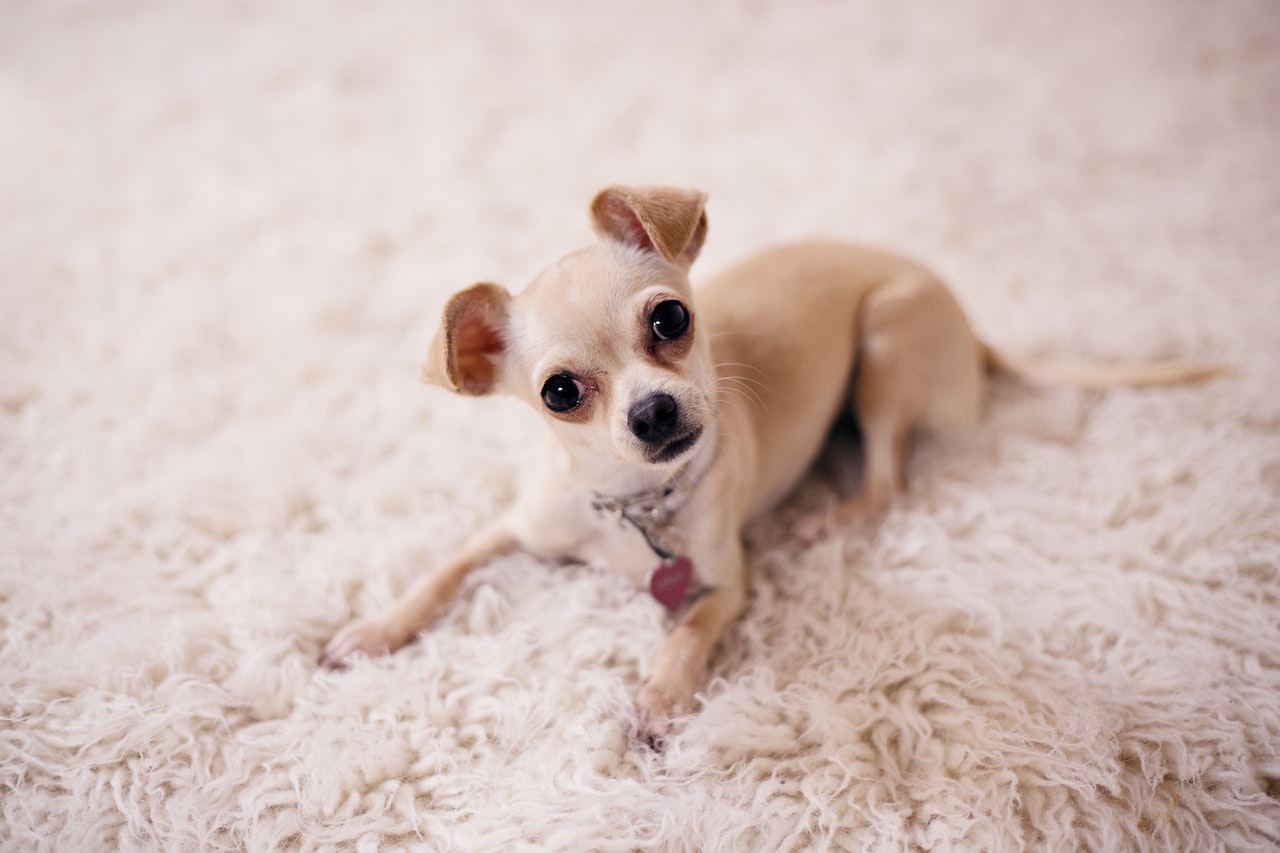
The most common reason behind your Chihuahua’s affinity for poop is boredom. If a Chi is left alone without anything to occupy its mind, it might resort to eating inedible items like fecal matter.
Take note that poop eating is just one of the problems that boredom may bring. In the long run, boredom can also trigger destructive tendencies in Chihuahua and even strengthen the breed’s aggressive predisposition.
Overall, Chihuahuas aren’t high-energy dogs and they don’t require a lot of exercise. A short playtime is enough to beat this doggo’s boredom.
2. Poor diet
Another possible reason behind your Chihuahua’s poop-eating habit is poor diet. Since your Chi doesn’t receive ample nutrition, it may look elsewhere to satisfy its needs. Unfortunately, they may find the stinky poop in your yard as the immediate target.
It can be your own Chihuahua’s poop or another animal’s excrement. This is why coprophagia is a very dangerous problem.
Most of the time, dogs will be attracted to eat poop if there is undigested food matter on it. The enzymes and protein on the undigested food matter are somewhat attractive to an undernourished pooch.
Aside from that, Chihuahua owners should remember that proper nutrition isn’t just about the quantity but more about the quality.
Also, each Chihuahua has unique dietary needs. It’s important to consult your dog’s vet to ensure that you’re providing the right diet based on its overall health and age. Remember, a diet that’s best for a different Chihuahua may not be the best for your own pet.
3. Stress and anxiety
Stress can wreak havoc on your Chihuahua’s body and behavior. It can drive the pooch to eat inedible items, including feces and items at home.
Take note that Chihuahuas are social creatures. If left alone for long periods, they will get heavily stressed and anxious. It’s important to address this problem before it leads to the gross habit of snacking on fecal matter.
Isolation, poor training, and lack of stimulation can make a Chihuahua easily stressed. And since they are pretty sensitive dogs, sudden changes at home can also lead to stress-related problems like aggression, refusal to eat, or even consuming feces.
4. Parasites
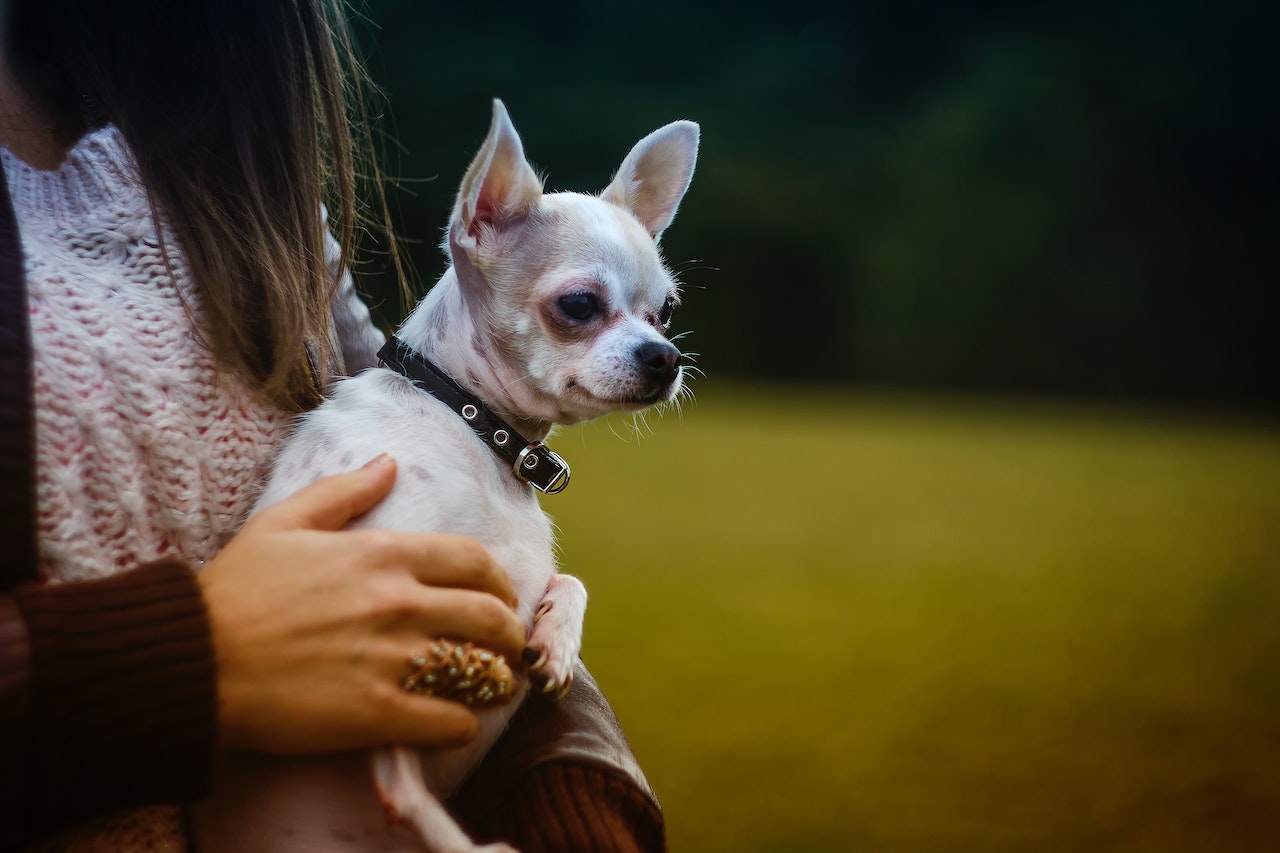
Chihuahuas with intestinal parasites may start to eat poop as the worms start to steal their nutrition. This has to be addressed right away as feces also contain other parasites that will make your dog’s condition worse.
Also, poop eating isn’t just the problem that parasites bring. Your Chihuahua will also suffer from weight loss, poor digestion, poor appetite, and life-threatening complications.
Overall, parasites are very easy to prevent among Chihuahuas or any dog for that matter. Most Chihuahuas can be dewormed as early as three weeks, but it should be done with the supervision of the veterinarian. Also, deworming must be done carefully among teacup and toy Chis because their tiny bodies are susceptible to side effects.
5. Medication side effect
Drugs like steroids can cause unusual side effects in dogs, including coprophagia. If you suspect that this is the culprit behind your Chihuahua’s behavior, you should consult your dog’s vet immediately.
Aside from that, a seizure medication in dogs called phenobarbital may also trigger this behavior. It happens because this drug triggers appetite and hunger.
Usually, medication-related poop eating will stop once your Chihuahua has been weaned off the drug. But if it persists, other reasons might be at play.
6. Pica
Pica is a condition where humans and animals consume inedible items. This can be poop, clothes, hair, fur, and the list goes on.
Overall, Pica can be a secondary condition to a bigger health problem. It can be hard to diagnose and treat because experts aren’t completely sure what’s causing it in the first place.
If you suspect that your Chihuahua has pica, the best thing to do is call its veterinarian. The vet may advise that you bring the pooch to the clinic for a more in-depth examination.
While pica can be hard to address, there are ways to manage its symptoms.
7. Appetite-inducing conditions
Lastly, underlying health problems can also be the culprit of your Chihuahua’s gross habit. Health conditions like Cushing’s disease, thyroid disease, and diabetes might be the root cause.
These conditions often trigger an abnormal increase in a dog’s appetite. When that happens, your doggo may start to graze around or poop.
How to stop Chihuahua from eating poop
The good thing is that there are ways to stop your Chihuahua’s poop-eating habit. The following points can help if your dog has this problem.
1. Rule out health problems first
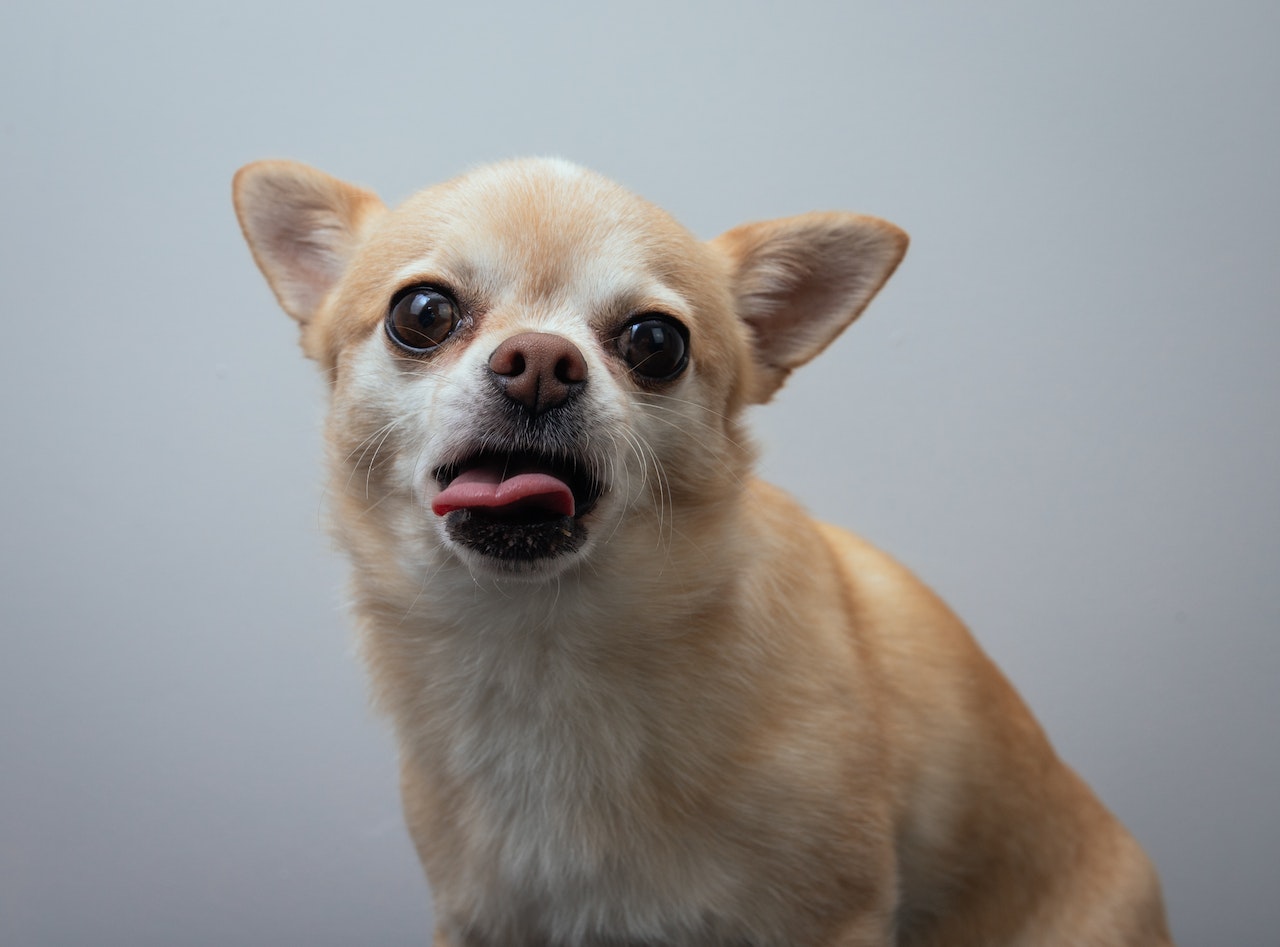
The first thing you have to do if your dog is eating poop is to rule out potential health problems. It’s because non-veterinary approaches won’t work if your Chihuahua is actually sick.
To do this, you must bring your pooch to the vet as soon as possible. Depending on the initial findings of the veterinarian, your Chihuahua may undergo blood tests, X-ray tests, and so on.
The results of the tests will give your dog’s vet a clearer picture of its condition, thus an appropriate treatment plan.
Take note that you should never self-treat any health problem that your Chi may have, especially if it’s serious. Also, coprophagia is sometimes rooted in a complicated condition that requires the expertise of a veterinarian.
2. Clean after your Chihuahua
Your Chihuahua won’t get to eat poop if there’s nothing of it around. With that, make sure that you scoop your Chi’s excrement right after each potty trip. Always have bags ready, so you can seal the stool and dump it into a covered trash can.
You should do the same with any animal excrement that could be found in your yard. You’ll never want your Chi finding pathogen-laced poop around and consuming it.
I don’t recommend burying the poop by dumping a small amount of soil in it. Remember that dogs have a very strong sense of smell and they can still find their last potty spot easily. And if you just covered their poop, your Chihuahua can easily dig it and enjoy a gross snack.
3. Don’t let your Chihuahua roam freely
If your Chihuahua is a notorious poop eater, you shouldn’t let it roam freely around the yard. Always leash the dog, so you can control wherever it will want to go.
You should do the same when taking your Chi to public places like parks, streets, lakes, and so on. While this will cut the fun for your little doggo, it’s better than letting it get sick from eating fecal matter.
If you don’t want to restrain your Chihuahua on a leash all the time, you can create a dog run instead. It’s a covered and fenced area of your yard that’s bigger than a cage. It will let your Chi run, smell, and explore around without getting to hunt for poop. Overall, this is an effective solution, but it surely costs some money and takes a lot of effort to build.
4. Make poop unappealing
The most effective way to stop your Chihuahua from eating poop is the make the excrement taste awful. Taste aversion has been proven effective not just in coprophagia, but also in destructive chewing.
Dog owners swear by adding pumpkin into their Chihuahua’s food because it’s believed to make canine’s stool unappetizing. Some also use meat tenderizers.
Overall, these are safe solutions that even taste well. Also, the pumpkin has a lot of fiber, which will encourage better digestion and healthier bowel movement. However, it gives the feces a terrible odor and flavor, which could stop your Chi from eating it.
Whatever solution you choose, make sure that it’s safe for your Chihuahua. You can also consult the vet for any medication that you can use for this purpose. Also, be careful with human food items as some of them may appear harmless but is actually toxic to pets.
5. Consider a diet change
Since a poor diet can be the reason behind your Chihuahua’s coprophagia, you should consider switching to a new food product. Opt for a complete and balanced diet to ensure that your dog is receiving ample nutrition in every meal.
Also, you should consult your pet’s veterinarian to know what’s best for the doggo. Chihuahuas with special needs will require an equally special diet, which the vet will recommend.
Whatever diet you choose for your Chi, always perform the transition slowly. Start by replacing a small portion of its meal with the new food. If your dog didn’t exhibit any signs of irritation, you can replace a bigger portion until you have fully shifted your Chihuahua to the new food.
Go with the change as slowly as possible to ensure that your Chihuahua won’t suffer from any problems.
6. Consult the vet about supplements
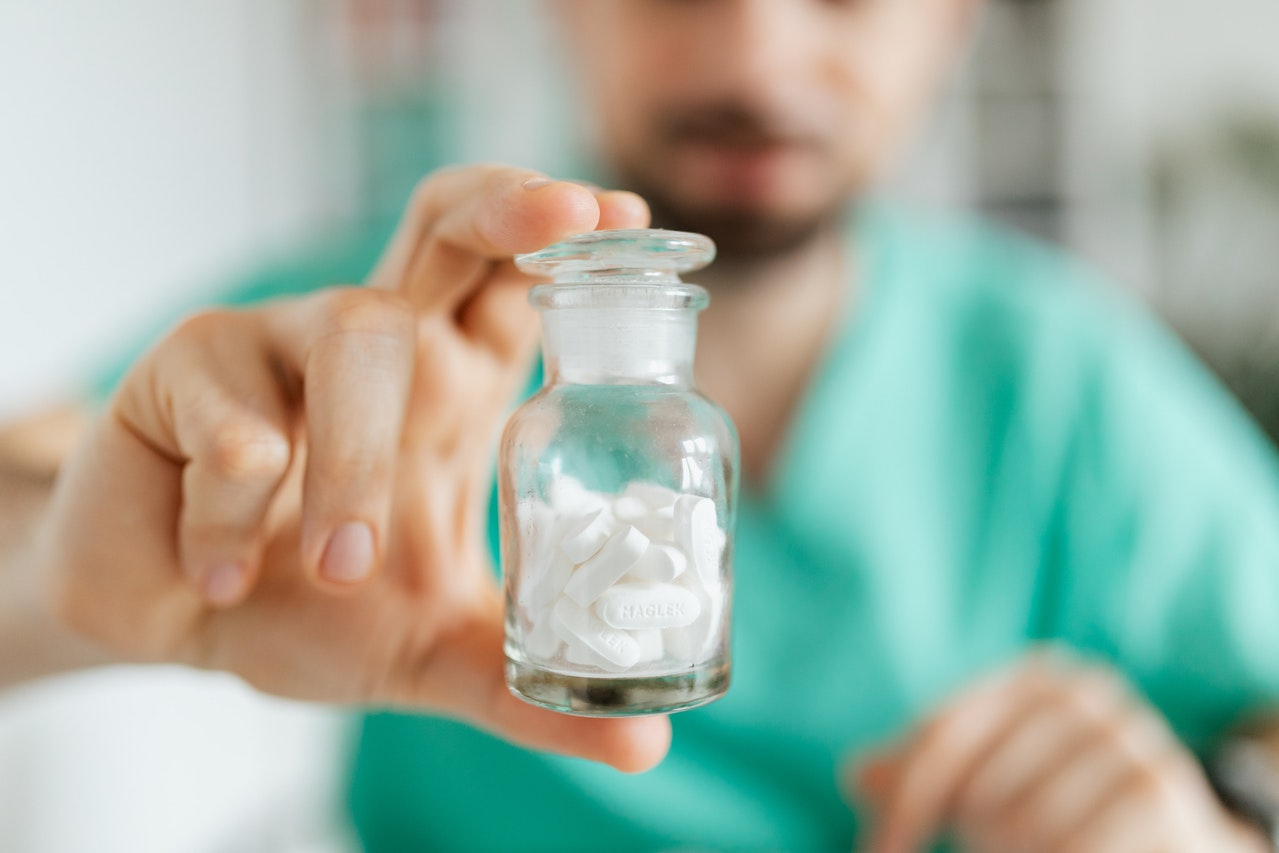
For Chihuahuas suffering from deficiency-related coprophagia, a new diet may not be enough in some cases. If so, you can consult the vet for the potential use of supplements.
Enzyme supplementation is a common solution here. Some pet owners saw positive changes in their Chihuahua’s poop eating habits after giving it a papain-containing enzyme supplement.
Meanwhile, vitamin B1 supplements are also helpful. However, you should only give this to your doggo if it has been confirmed to be suffering from a deficiency. It’s because most dogs will get all their needed nutrients from their diet.
Overall, this is just an optional solution that must be approved by the vet first, especially since Chihuahuas are small canines.
7. Come up with an exercise schedule
Bored Chihuahuas may develop coprophagia if they continuously lack physical and mental stimulation. To prevent this from happening, you must create an exercise plan that will satisfy the needed stimulation of your pet.
Overall, Chis are small and won’t require exercise as rigorous as those for Golden Retrievers. A short walk around the neighborhood and playtime sessions throughout the day would be enough.
If you need to go to work and leave your Chihuahua at home, make sure that it has lots of interactive toys. It’s also a good idea to crate-train your pooch, so it won’t seek the outdoors while you’re away. Also, dogs don’t soil their crates when trained, which removes the possibility of them eating their own poop.
8. Provide diversion
Diversionary tactics work well in distracting your Chihuahua from eating feces. You can provide the Chi chew toys or one that can be filled with treats. This will create mental stimulation, so your doggo won’t even think of going outside and eating poop.
Anything that will occupy your Chihuahua’s mind will do. Just make sure that your choice of diversion is safe, especially if you’re going to leave your dog alone with it.
Take note that training should also be part of the diversion. This is to ensure that the solution is actually effective for your pooch.
9. Remove potential stressors
Chihuahuas are sensitive canines and they can get stressed very easily. It’s important to raise them in a predictable environment with the least possible stressors.
For example, you should keep your Chihuahua in a room away from loud noises. Also, some Chis may not like having strangers around, so it’s best to keep them away when you have guests.
Basically, every Chihuahua is different and so are the things that could stress them. Observe and adjust as you go along to ensure that your Chi won’t resort to poop eating to soothe its nerves.
Also, it’s very important to desensitize and train your Chihuahua, so it won’t become too nervous toward common stimuli. Be patient and don’t hesitate to consult a professional dog trainer if need be.
10. Brush up on obedience training
Obedience training can help a lot in combatting coprophagia in Chihuahuas. Commands like sit, stay, leave it, and come will give you some control over your pooch’s behavior.
When your Chi is sniffing on the ground, you can call its name or give a different command to distract it. If your dog comes to you or heeds your command, give it a food reward immediately. This will teach your dog that leaving the poop alone is a rewarded response.
Just remember that Chihuahuas may respond slower to training compared to other breeds. Again, patience is necessary. You can always hire a professional trainer if your Chi isn’t responding well to your efforts.
As much as possible, get your Chihuahua started on training early. It’s easier to train a puppy Chihuahua that’s yet to form its habits and preferences.
11. Never use punishments
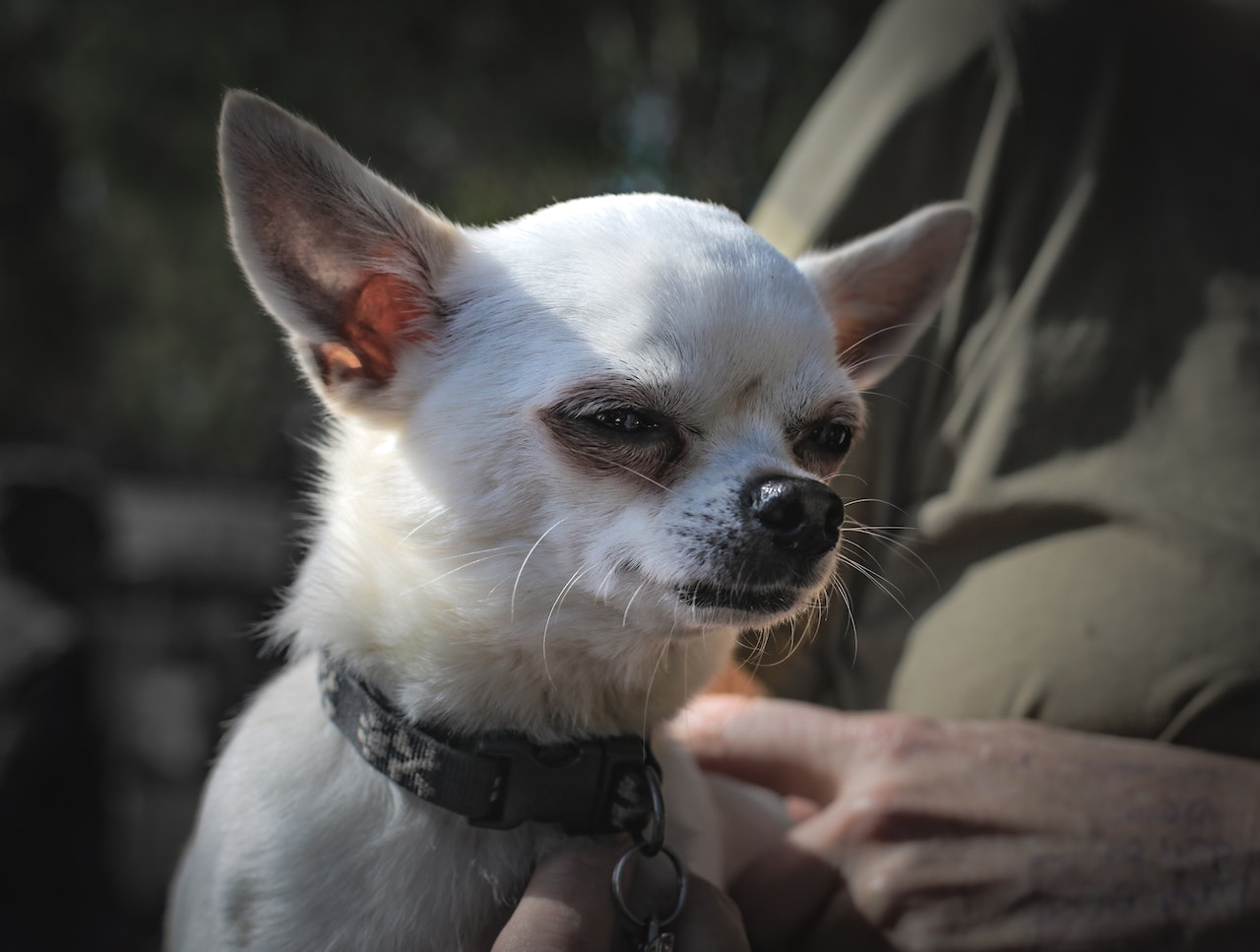
No matter how frustrating coprophagia gets, you should never punish or use violence on your
Chihuahua. This will just stress the doggo even more and lead to further poop eating.
You can ask any pet trainer and they will always tell you that positive reinforcement is always the best method. It works by rewarding positive behavior, so your dog will be encouraged to do it repeatedly.
In comparison, punishments will just fuel your Chihuahua’s aggression. It will also lead to a slew of other behavioral issues that will be a pain to fix later on.
12. Consult the veterinarian
Lastly, you should consult a veterinarian if your Chihuahua’s poop-eating habits aren’t going away. The vet can prescribe possible treatments and identify potential health problems that are causing coprophagia.
Aside from that, involving the veterinarian is necessary because poop can make your Chihuahua ill. If your doggo suffers from prolonged diarrhea and vomiting after consuming feces, you must bring it to the vet immediately.
Will my Chihuahua outgrow poop eating?
Yes and no. Puppies are more likely to eat poop or basically any inedible item they can find. This is considered normal because of their inquisitiveness and teething phase. In most cases, the little Chi will outgrow this and eventually leave poop alone.
However, there are also some dogs that won’t overcome coprophagia naturally. In this case, the problem may become even worse. It can turn into full-fledged pica, which is hard to treat.
Whatever the case is with your Chihuahua, you should never tolerate poop eating. Stop your dog the moment you see it fixating on a pile of feces.
Most of all, you should ensure that your Chihuahua is receiving proper nutrition, exercise, stimulation, and care. This way, it won’t look elsewhere to satisfy its cravings. Training is also an integral part of the process if you also want to combat other behavioral issues.
Frequently Asked Questions
Q: Do dogs get sick from eating poop?
A: Your dog can get sick from eating poop. Even if canines have strong gastric juices, they won’t withstand the pathogens found on poop. Your doggo can get worms, bacteria, parasites, and a slew of other nasty infections that can be potentially life-threatening. So even if poop eating is common in dogs, you should never tolerate it.
Q: What percentage of dogs eat poop?
A: About 24% of dogs are found to have eaten poop at least once in a while. On the other hand, about 16% are notorious poop eaters, which means they consume feces on a regular basis. So if you discovered that your Chihuahua is eating poop, you shouldn’t panic.
Q: Does broccoli stop dogs from eating their poop?
A: Broccoli makes dog poop smell nasty, so it’s likely to stop your Chihuahua from consuming its own fecal matter. However, you should know that like other cruciferous vegetables, broccoli can give your Chi smelly and loud farts.
Q: Why do dogs eat poop during winter?
A: During winter, poop is more visible in the middle of the snow. Also, the old fecal matter will freeze and become “crunchy” poopsicles. This will make it appealing to canines. But regardless of the season, you shouldn’t tolerate this habit as it can get out of hand, which is harder to fix later on.
Q: What vitamins are missing when a dog eats poop?
A: Canines eat poop because they are experiencing a nutritional deficiency. Experts suspect that Vitamin B deficiency might be the reason why some canines resort to eating feces. It’s because some bacteria found in the fecal matter can produce thiamin, which is a type of B Vitamin.
Final words
Knowing how to stop Chihuahua from eating poop will save your dog from infections and your pocket from vet bills. Overall, this is a common problem, but something that you shouldn’t dismiss.
Don’t hesitate to consult a veterinarian and a pet behavior expert if things are going out of hand. There are possible treatments for coprophagia and many dog owners have seen positive results.
What do you think of these points? Share your thoughts in the comment section!
Here at ILoveChihuahua, we share our personal experiences as owners of this feisty breed. We talk about recommended methods, dog supplies picks, and advice on common Chihuahua problems. Our goal is to promote responsible dog ownership, so there would be fewer Chihuahuas in shelters.

